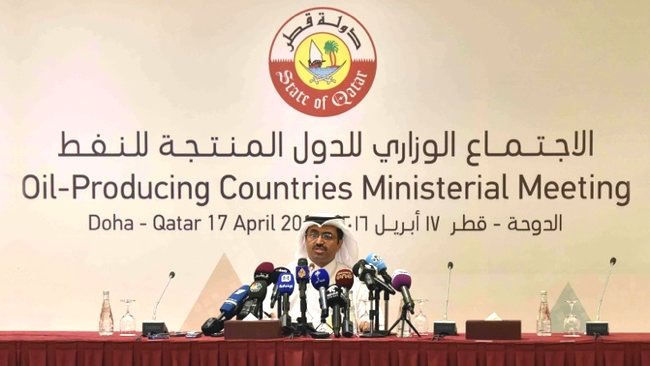-
Tips for becoming a good boxer - November 6, 2020
-
7 expert tips for making your hens night a memorable one - November 6, 2020
-
5 reasons to host your Christmas party on a cruise boat - November 6, 2020
-
What to do when you’re charged with a crime - November 6, 2020
-
Should you get one or multiple dogs? Here’s all you need to know - November 3, 2020
-
A Guide: How to Build Your Very Own Magic Mirror - February 14, 2019
-
Our Top Inspirational Baseball Stars - November 24, 2018
-
Five Tech Tools That Will Help You Turn Your Blog into a Business - November 24, 2018
-
How to Indulge on Vacation without Expanding Your Waist - November 9, 2018
-
5 Strategies for Businesses to Appeal to Today’s Increasingly Mobile-Crazed Customers - November 9, 2018
Oil Production Freeze Talks in Doha Collapse
The oil price fell last night following the Doha meeting of Opec and non-Opec oil producers failing to reach an agreement on a widely anticipated output freeze.
Advertisement
Lower potential US supply is one of the reasons why oil prices have rallied more than 60 percent since their early year lows – alongside expectations of some sort of deal emerging at the meeting in Doha.
Instead, however, Saudi Arabia pushed to include Iran in any freeze agreement.
There are already signs that output is falling sharply among higher cost producers, and the economic pain caused by cheap oil could eventually lead to price-inflating output cuts instead of a freeze to production when OPEC next meets again in June.
Oil minister emphasized that oil sanctions were ended after months and years of negotiations; “still, some major oil producers are after freezing Iran’s oil productions on the basis of the output in January 2016”. Saudi Arabia said it wouldn’t back a deal if regional rival Iran, which is trying to increase output as global sanctions are lifted, wasn’t involved.
At press time International Benchmark Brent crude was trading up at $43.58 while the American Benchmark West Texas intermediate was trading up at $40.44 a barrel.
“An agreement on production caps, which had still seemed possible the day before, collapsed because of Saudi Arabia, which demanded that all oil producers – that is to say including Iran – should be included”, Commerzbank analysts said in a client note.
Bjarne Schieldrop, chief commodities analyst at Nordic corporate bank SEB said: “We don’t think there will be a deliberate and significant ramp up in oil production by the freeze negotiating countries as a effect of the fact the deal fell apart”. Oil had been on an uptick on optimism that a deal would be reached at the meeting.
Croft thinks emerging supply disruptions in countries facing stress, including Venezuela, Nigeria and Kuwait, may be what helps the oil market rebalance.
The next meeting of OPEC members is scheduled for June in Vienna.
The oil market late Monday recouped heavy losses spurred by the failure of major crude producers to agree curbs on output that could have firmed up the market.
“They are fearful that the world may be in a weak or bearish market for a long period of time. The failure of the Doha meeting reintroduces those speculations”, said Olivier Jakob of Petromatrix, a Swiss- based consultancy.
Advertisement
OPEC said its members pumped 32.25 million bpd in March – with Saudi Arabia accounting for almost a third – up from an average of 31.85 million bpd in 2015.





























